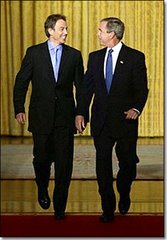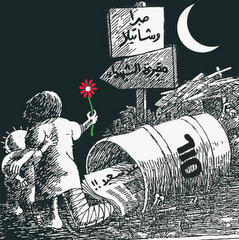Definition of the system and the position of the American administrations - the rationale to justify the American system - reflections and reactions Almtoukahowla strategy: level Alaalmithania: in the Middle East With the advent of the new American administration Republic returned System Shield American anti-missile (National Missile Defense - NMD) and issued agenda concerns in the international arena since the administration announced its decision to proceed with the implementation of this project, which the Clinton administration had postponed a decision on it at a crucial year. Combines observers on the existence of security reflections of the system affect the strategic balance between the big powers, namely the United States, China, Russia, and also affect the international treaty limiting the proliferation of ballistic missiles, the prohibition of nuclear weapons, and accelerate the arms race and destabilize the international balance in general and the Middle East in particular. The definition of the position of the American administrations Definition of the system: "means a shield American anti-missile" building protection networks composed of ground missile systems, based on the geographic focal points of several, capable of shooting down any missile ballistic missiles aimed at passing American land. This system - if implemented - applied for the first time in the world by major country, which is prohibited by the Treaty on the Limitation of ballistic weapons (ABM), which went roadmap deliberately keep the airspace open, unprotected view to finding mutual deterrence between the major countries. The threat potential sources upon which the American system strategy Shield and expected departure missile attack against the United States is primarily Iran, Iraq, North Korea, Cuba and any country fall under the classification of "rogue States", as adopted by Washington. As is clear occupies two important Ostitan East, one Arab and other Islamic site "heart" in the sources of threat to the United States and encouraging the construction of this system. Meanwhile, the process of advancing Iran and Iraq because existing American detente in relations - North Korean and continues to expect internal collapse of the latter in the coming years and increase the likelihood of integration with the South Korean section as the integration of East Germany with the West, this is the one hand and on the other hand due to the deteriorating economic conditions in Cuba, which seems to be the other in the final fifteen minutes of her revolutionary, and expected many to conclude after an absence Castro. Even his presence back militarism and menacing supposed to problems of poverty and the economy exhausted and the efforts to maintain the cohesion of the state itself. American administrations position of the improvement noted beginning to return this issue strongly to the front of the international political events coincided with the election of George Bush and the Republicans the White House, who adopted the "acceleration" in the building of missile defense network as a national security issues that have been invested in the election campaign on the background of a "slowdown" shown by the Democrats to move forward with the project. The Clinton administration months of the recent decision has been taken to postpone a decision on the matter, which exploited until the end, Republicans accused their opponents of being Itrakhun to defend sensitive national security of the United States. The reasons for the postponement of the Clinton administration to take a crucial decision back to a combination of factors, including: Non get Russia and China, the European Union and hope to reach a compromise formula with those parties not provocative to implement the project. Deep suspicions in practical effectiveness of the entire system after the failure of several famous test launch test went fishing missiles to attack American targets on American land. The high financial cost of the program, which is in some estimates exceed forty billion dollars.This background showing their location by the missile defense strategy in electoral campaigns bid for the presidency important because it sets an initial question about how serious the risks assumed strategy and the extent of overstatement, which quickly pushed the idea that occupies huge "essence of American national security" in the next stage. American justifications to justify the Justifications cited by Washington for its allies and enemies alike are based mostly on two key elements: That the missile defense system is not causing any radical changes in the status quo of the global security and balance, this network is designed to repel missiles limited individual may give intentionally or by mistake on this state "rogue" or those, and not designed to - can not - be overwhelming repulsed an attack by missiles Menhmrh profusely Whether such an attack comes from Russia or China, the countries most affected by the imbalance caused by this network. Thus, the "mutual deterrence" by keeping international balance remains and fears of disruption of that balance between the major powers exaggerated. This network may evolve to include the future of NATO itself, and thus the harmony of the partnership with Europe rather than keeping away from them.
But the American justification involves example: It tends value of the project "defensive and propaganda" as a major essential component of a strategy the Republicans in defending the potential risks. If such a system can not effectively repel an attack from Russia or China, it is no exaggeration to give him and trying to persuade potential public opinion vitality and decentralize the region. The attempt this with the Washington marketing idea defense limited the effectiveness of the system remains surrounded by deep doubt, it is natural that the design of such a system taking into account the possibility converted and developed quickly, in emergency situations, to be able to repel the attacks heavy. The fact that any of the States that go to this system any "rogue States" on an advance suicide when it launched a missile against the United States. And discussion of this contradiction is the essence of the talk about the Middle Eastern dimension of the system. Reflections and reactions Strategy Expected Multiple levels of the strategic repercussions and reactions anticipated by the American missile defense system at the level of global security generally, and in the Middle East in particular: First: the level Alaalmimn expected to create implications of this system at the global level a climate similar to the Cold War atmosphere where security threats are global mutual continental arms race and paid enormous strides forward, due to a number of important strategic considerations, in the forefront: This system works on the strategic imbalance specifically with China and Russia can not be tolerated by those two countries. On one hand, if the process of completing its application provides the United States an unprecedented strategic superiority on those two leaving them Msfti back to the strategic vulnerability of utmost not Tslaha in maximum tension in the post-war era. The use of the system across the United States can bring down any ballistic missile based on it, in theory, from China or Russia, while not able either of these two refute any American rocket from the same level ballistic. In other words, at a time when the United States is immune from any rocket attack outside because they can irreversible countries of the world all be exposed to any American rocket attack since none of the nations of the world do not have the capacity buffer itself owned by the United States, a situation that did not happen strategic flawed in any time in past decades that followed World War II. This system works to expose convention limiting the spread of ballistic missiles (ABM) to the risk of cancellation. This Convention, which took place between the United States and the Soviet Union in 1972 had banned the establishment of such networks, national defense, and kept the airspace open and exposed to attack as a means of mutual deterrence to all States, where not make any state to use ballistic missiles intercontinental missiles for fear that the response will be in kind of by the State, which was exposed to an attack. Now theoretically the United States can progress so without fear of retaliation from the same type. Fear that this system will not only protect the land specifically American, and that it will not only be the first phase of the American security strategy "globalized" more serious than might appear at first glance. There will be subsequent stages in the context of this strategy aims to provide cover similar missile defense for Washington's allies, such as geographically distant from Japan, Taiwan, or on the borders of China and traveling vital and frustrate its supremacy in the regional, which brings the relaxed sleep eyes of Chinese strategists. Concern of the EU countries, ally across the Atlantic to Washington and the historic partner in NATO, from the system and felt that Washington does not receive not the Atlantic partnership to adopt strategies for global security, while criticizing it Alo'roureyen strongly when deciding on the European security alone and without consultation. The idea was met with severe criticism missile system and Brod, even before the Great State closest political and strategic to the United States. It may be noted that the increasing frequency of the draft shield American anti-missile accompanied by the European Bank for Atlantic escalation projects "Europeanization" security of the European continent through the formation of a European security force separate from NATO, or deepen component and the European identity of NATO itself. Despite all the criticism, direct or indirect attack on the American project by the European allies, and threats internalized the transatlantic partnership between the United States and Western Europe, Washington stubbornly insists on the move until posed with some voices from European prospects, even far-reaching that this the beginning of the disintegration of NATO and the same isolation United States and Europe each individual to establish a special security away from the long-standing partnership of the Second World War and the evolution of the cold war. Second: in the Middle Alaustrgem central strategy in the Middle East, the missile defense debate and controversy going around not give this parallel dimension size of its importance, particularly in terms of its negative effects on the region. There is no calculation for the opinion of the Governments and peoples of the region in their interest, particularly since the Arab states silent on the subject and heard no objection seriously by the United States does not pay even forced to explain and justify this program for the region's countries and public opinion. The dimension of the Middle Eastern American missile defense system in three dimensions: Serious allegations of threat to the security of states and cities by American missiles Iranian or Iraqi. Israel's role and its place in this system. Marketing missile defense systems in the Gulf region and the revitalization of American sales. First: Suppose sensation serious risk that both Iraq and Iran possess, or Simlkan, missiles that can hit American cities, as opposed to estimates of the UN disarmament committees at least as far as the side of Iraq. Although this hypothesis and to detect the seriousness of the allegation Iranian danger or the Iraqi question should be directed meditation and following it: Is it possible that Baghdad or Tehran to the suicide voluntary and even launch missiles at any one American city, in the light of estimating profits and losses as a result of this step? Is it possible to Baghdad in the light of the solution and continues to solve Iraq from destruction and siege at the hands of Washington and governed by the Iraqi file in the Security Council for ten years although it did not launch even one shot on any American city, as well as to launch a missile? Is it possible to provide Tehran in the light of the solution and still solve Iran because of the embargo and tighten the American - the western and without even fired one shot at the American land, as well as to launch a missile? Can any analysis equally strategic objective and rational say that the two countries are looking at the amount of retaliation and revenge event expected to step foot launch missiles against American cities? Allen asks decision-makers in the capitals of any of the proceeds of military, political and diplomatic than can be achieved against such adventure suicide? Wallis more logical to think the enemies of the United States in the Middle East, whether states or organizations who have, presumably, intercontinental missiles and worried Washington, that it is better for them a thousand times, that they want to go to war breaking bone with the United States to strike its interests in region instead fight a losing war across missiles against cities and lands? Probably say here that such accounts are inside the "rationality and rational policy," which does not apply to politicize any of the two countries, but in fact denies this statement through its policy of the two countries themselves in recent years, which is governed by profit and loss accounts especially in dealing with major countries and the United States in particular. Even possible to say that even step invasion of Kuwait, despite the wishes of, the decision has been taken when the Iraqi side to the logic of profit and loss accounts, and after that understanding Hints American, rightly or wrong, that Washington would not care about the case to step oldest Iraq's invasion of Kuwait. As to Iraq itself, subject to the profit and loss accounts of rationality at the height of his military defeat during the war did not resort to the use of nuclear or chemical weapons against the coalition armies application of the logic of estimating the response expected by the opponent. And applies to Iran, which refrained from engaging in the war according to the profit and loss accounts delicate political governed by the logic of a realistic and pragmatic. It also abandoned the idea of "exporting revolution" docile to the logic of political realism. It years ago to pursue a moderate foreign policy objective of changing the image of Iran in the West and the world of a "terrorist and fanatic" to a modern and rational. It is therefore likely even a 1% say that the Iraqi or Iranian missiles will be brought to the American territory in the coming years is, I do not deserve to be generated strategic missile defense searching for the enemy in parts of the earth. This eventuality is also assumed that the United States policy towards those countries had not changed and remained intransigent and not open. Certainly, the lack of possibility launching of an Iraqi or Iranian missile towards the United States will take hold in if Washington decided to adopt a policy of hostility towards the two lower heading towards cooperation and not beating the drums of war. If we have noted that the system of sanctions and the embargo on Iraq Il to the disintegration at the end of the day, and that the policy of moderation in the Iranian foreign policy is Baltrsch even among the hard-liners (especially in the decision-making circles military and strategic) may we expected the American relations - Iraqi and American - Iranian direction less escalation and hostile in the next ten years, despite what now seems tense sudden carrot review by the American administration Republic to prove oneself and chart a course different view different than any other clear goal, which means that the course will not go much will boomerang into reality says that the blockade Iraq is on the downtrend in the curve. For all this, the development of the two countries, Iraq and Iran, on top of the list of risks that threaten the delusional American national security is directly exaggeration meaningless unless it has other goals undeclared. Second: The location of Israel in the Aldvaaihna There intersections between Israeli missile defense strategy and its American spoke for the first time and justified in terms of the development of Iraq and Iran at the site of Advanced threatening to American national security, and notes on the future of the strategic relationship between the two parties and outward towards new horizons unprecedented. It is the first foundation for a strategic change that has occurred is on the agenda priorities of the Israeli strategy after the Gulf War and the arrival of Iraqi missile to Tel Aviv. Shortly war, and the impact of the failure of the American Patriot system in toppling Iraqi missile, Israel worked to develop the program tremendous Arrow missile systems aimed at establishing a network of missile defense is not penetrated by any Iraqi missile, or Iranian or Syrian or Egyptian. The United States engaged in the program from the outset strongly support and coordination, which made him more than $ 1.1 billion, as well as the substantive participation and bilateral programs. Israel has succeeded in the development of the sophisticated missile defense systems and facilities excelled at the American technology itself. Israel announced in the last quarter of last year, it published regulations Soaik Arrow defensive missile is protected from attack from abroad. In perspective, the Israeli threats against the first built Arrow defense system comes from Iraq and Iran. This means that the Israeli strategy here in line with their counterparts in the American perception that the threat to the territory of the two countries comes from Iraq and Iran. The new thing here is that this consensus is happening for the first time such depths, especially by the United States. Previously, Alnzertan match against American and Israeli sources danger in the Middle East against the "interests of the two countries" and not against "the territory of the two countries." The danger which threatens the "land of Israel" was not considered by the Americans a threat to their land (Syria, Egypt, Iraq, the PLO and the Soviet influence, and the States and the revolutionary organizations in the region ...). Now, because of active American policy escalating this consensus emerged and the evolution clearly fueling him certainly new patterns of tension "missile" will beset the region in the next phase. The imbalance missile defense systems and associated for Israel blatantly will not receive intimate reception by Arab capitals in the Orient. The rates will increase from the race and a further drain on resources of the region and opens a new chapter in the chapters of duplication of American policy in the region, which claims that it wants to support the development and stability in the region and on cords wars and tension. Third: Marketing defense systems in the American Alkhalijama third issue is linked to the idea above is the impact of the recent missile defense system on the attempts to market the American air defense systems in the Gulf. It certainly create an atmosphere "missile tension" in the region accompanied by several developments such as heating outlook hostile to Iraq and Iran from this angle, and the superiority of Israel in missile defense systems, and the disillusionment of Arab States, the Gulf states continue to notice the potential threat from Iran and Iraq, and oppose any Gulf collective security system that does not depend on the outside world, all that will expand the sales market American missile defense systems and invigorate. Did not leave the United States this in the guesswork and analysis by the William Cohen, Secretary of Defense, former American, in November 2000 to visit an expanded marketing in the Gulf by offering to engage in the "defense cooperation initiative", based on the deployment of Patriot batteries regimes in the region to intercept any missile attack (and presumably implies coming from Iraq or Iran). Strangely enough, the topic that these systems to be marketed on the Gulf States are the regulations for Feztha Israel because of ineffectiveness tested in the Gulf War, Israel and replaced by Alvaro missile systems. * Visiting Fellow, Department of Middle Eastern Studies and Islamic University in Cambridge.













